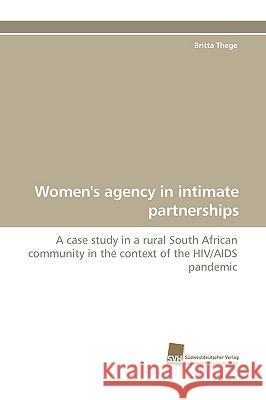Women's Agency in Intimate Partnerships » książka
Women's Agency in Intimate Partnerships
ISBN-13: 9783838110509 / Angielski / Miękka / 2009 / 324 str.
The South African HIV/AIDS pandemic exposes the hegemonic intersection of gender, power and sexuality.This qualitative study aims to explore South African rural black women's agency in intimate partnerships at a time of transition and amidst the HIV/AIDS pandemic. It explores whether there is some empirical evidence for what is a common perception, namely the lack of agency that rural black women have in negotiating their sexual relationships and the impact that this has on the risk of HIV/AIDS. One of the assumptions made was that age is a critical variable because of the changing dynamics of time figurations in gender practice. The author suggests that in non-violent partnerships the decisive variable for a woman's capacity for agency both in terms of decision-making on having sex as well as their potential for HIV self-protection strategies is marital status and not age.
The South African HIV/AIDS pandemic exposes the hegemonic intersection of gender, power and sexuality.This qualitative study aims to explore South African rural black womens agency in intimate partnerships at a time of transition and amidst the HIV/AIDS pandemic. It explores whether there is some empirical evidence for what is a common perception, namely the lack of agency that rural black women have in negotiating their sexual relationships and the impact that this has on the risk of HIV/AIDS. One of the assumptions made was that age is a critical variable because of the changing dynamics of time figurations in gender practice. The author suggests that in non-violent partnerships the decisive variable for a womans capacity for agency both in terms of decision-making on having sex as well as their potential for HIV self-protection strategies is marital status and not age.











